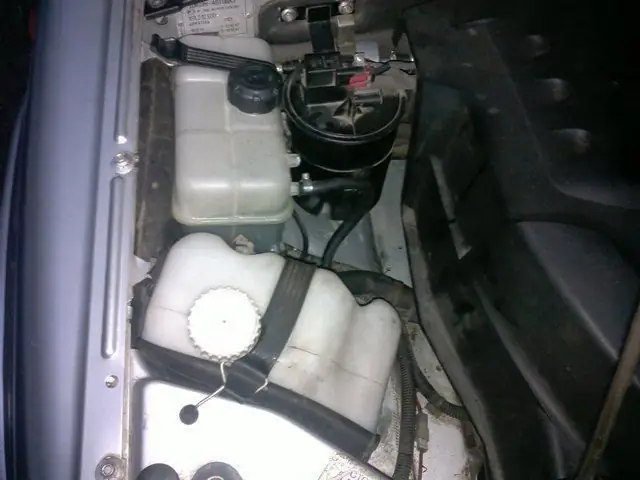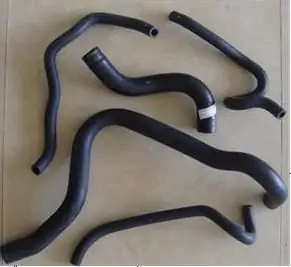2026 Author: Erin Ralphs | ralphs@carsalmanac.com. Last modified: 2025-01-22 21:14:12
The internal combustion engine works stably only under a certain thermal regime. Too low a temperature leads to rapid wear, and an excessively high temperature can cause irreversible consequences, up to jamming of the pistons in the cylinders. Excess heat from the power unit is removed by the cooling system, which can be liquid or air.

They have a different device, while the second design is much easier to manufacture and operate. But in modern cars, it is used extremely rarely due to its features and shortcomings. The first scheme has found wide application in the automotive industry. The pipes of the liquid-type cooling system act as pipelines through which water or antifreeze circulates.
Composition of cooling system equipment
In the manufacture of the cylinder block and head, its walls are made double. The space between the inner and outer surfaces is called the cooling jacket. To transfer excess heat to the atmosphere, the system has a radiator, which is installed in the front part and is blown by the oncoming air flow. If the pressure is insufficient, the fan is turned on, which can have a mechanical or electric drive.

To create and maintain fluid circulation, a pump has been introduced into the system. Branch pipes of the cooling system interconnect all its elements. There is also a device in the system called a thermostat, its function is to maintain the temperature of the coolant within the specified limits. When heated, the antifreeze begins to increase in volume, to compensate for this phenomenon, an expansion tank is introduced into the design.
The pipes of the cooling system are also connected to another additional device. We are talking about a car interior heater, or as it is customary to call it in common parlance with a stove. This is, in fact, another radiator, only the heat removed from the engine is spent more rationally to maintain a comfortable thermal regime in the car.
Separate parts of the system
Most of the critical components and mechanisms of the engine are made of ferrous or non-ferrous metals, some are made of polymers. To ensure the connection between the elements located on the operating power unit and a relatively stationary body, they are unsuitable. Materials are needed that will not transmit vibration and excessive load. System Hosescooling is made from rubber reinforced with strong threads.

The cooling system pipe kit is a high-tech product. There are special requirements for the material from which it is made. First of all, hoses must have high mechanical strength and resistance to the aggressive effects of aggressive chemical compounds. Heated to a temperature of 90-105 ° C, antifreeze is capable of destroying many materials.
In addition, the pipes must be flexible enough to compensate for the mutual movement of the engine and body. At the same time, they should not transmit vibration from a working power unit to the body. Currently, synthetic materials are increasingly being used instead of natural or artificial rubber. One of the most promising is silicone.
System maintenance
Reliability and uninterrupted operation of the engine, its units and components is achieved largely due to the well-established service. Maintenance of the cooling system consists in the timeliness of adding antifreeze to the expansion tank. However, the fluid loses its characteristics over time and needs to be replaced. This procedure, as a rule, is carried out after 50-100 thousand kilometers (or after a certain period of time) and is accompanied by washing shirts and radiators.

Replacement of pipes of the cooling system during scheduled maintenance is carried out only if necessary. For example,in case of detection of coolant leaks through the fistulas in the hoses. Predominantly damage to pipes occurs in the area of their connection with inlet nodes or under metal clamps. These parts provide tight contact between metal and hose material.
Preparation for repair and restoration work
It is better to replace damaged flexible pipelines in a suitable room: a garage with an inspection pit or a repair box with a lift. The process begins with the fact that the engine is turned off, after which it is necessary to wait some time for it to cool to an acceptable temperature. The machine must be placed in advance above the pit or on a lift in order to provide access to the components and assemblies from below.
Carefully open the cap of the expansion tank. Now we release the clamp at the lowest point and try to undock, which is not always possible due to the sticking of the material. In particular, the pipes of the cooling system (VAZ-2107 is an example of this) often have to be simply cut off. Drain the liquid into a prepared container with a wide mouth.
Some subtleties when replacing individual parts of the cooling system
To carry out repairs, we will need new parts, they can be purchased on a free sale - there is no shortage. For rare car models, analogues are selected that are most suitable in size and shape. However, you can order from official dealers and original spare parts. It makes sense instead of rubber hoses silicone pipes of the cooling system, performancewhich are much higher.

Installation of hoses is carried out on dry and clean seats. Then antifreeze is poured in and a leak test is carried out, first with the engine turned off and then with the engine running. High-quality pipes of the cooling system, when properly installed, do not need to use any additional measures for sealing.
Genuine spare parts guarantee long-term operation of the power unit without any complaints or problems.
Recommended:
ZIL-130 cooling system: device, principle of operation, malfunctions

ZIL-130 cooling system: device, features, location, working and auxiliary elements, volume, diagram. ZIL-130 engine cooling system: principle of operation, possible malfunctions, repair. ZIL-130 cooling system: compressor, radiator, maintenance
Car engine cooling system: device and principle of operation

The engine cooling system in the car is designed to protect the working unit from overheating and thereby controls the performance of the entire engine block. Cooling is the most important function in the operation of an internal combustion engine
KAMAZ, cooling system: device and repair

The car's cooling system is the most important structure for maintaining the engine's operating power. In the famous cars of the Kama Automobile Plant, the coolant ranges from 80-1200C. Considering that the temperature of the engine reaches 220 0C, the special importance of the engine cooling system becomes even clearer
Chevrolet Niva: cooling system. Chevrolet Niva: cooling system device and possible malfunctions

Any car contains several basic systems, without the proper functioning of which all the benefits and pleasure of owning can be nullified. Among them: the engine power system, the exhaust system, the electrical system, and the engine cooling system
Maintenance and repair of the engine cooling system. Soldering of cooling radiators

During the operation of the car engine, it heats up to sufficiently high temperatures, the cooling system is designed to avoid overheating. Repair, diagnostics and maintenance of this system are very important, as an overheated internal combustion engine will disable the car

